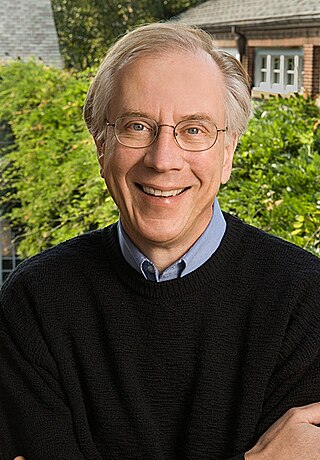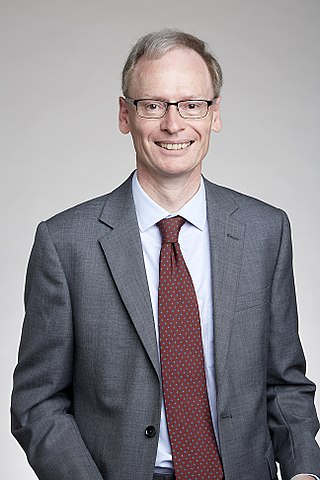Related Research Articles

Susan Lee Lindquist, ForMemRS was an American professor of biology at MIT specializing in molecular biology, particularly the protein folding problem within a family of molecules known as heat-shock proteins, and prions. Lindquist was a member and former director of the Whitehead Institute and was awarded the National Medal of Science in 2010.
Howard Robert Horvitz ForMemRS NAS AAA&S APS NAM is an American biologist whose research on the nematode worm Caenorhabditis elegans was awarded the 2002 Nobel Prize in Physiology or Medicine, together with Sydney Brenner and John E. Sulston, whose "seminal discoveries concerning the genetic regulation of organ development and programmed cell death" were "important for medical research and have shed new light on the pathogenesis of many diseases".

Thomas Robert Cech is an American chemist who shared the 1989 Nobel Prize in Chemistry with Sidney Altman for their discovery of the catalytic properties of RNA. Cech discovered that RNA could itself cut strands of RNA, suggesting that life might have started as RNA. He found that RNA can not only transmit instructions, but that it can act as a speed up the necessary reactions.

Eric Francis Wieschaus is an American evolutionary developmental biologist and 1995 Nobel Prize-winner.
Robert Allan Weinberg is an American biologist, Daniel K. Ludwig Professor for Cancer Research at Massachusetts Institute of Technology (MIT), director of the Ludwig Center of the MIT, and American Cancer Society Research Professor. His research is in the area of oncogenes and the genetic basis of human cancer.
The Gruber Prize in Genetics, established in 2001, is one of three international awards worth US$500,000 made by the Gruber Foundation, a non-profit organization based at Yale University in New Haven, Connecticut.
Gerald Mayer Rubin is an American biologist, notable for pioneering the use of transposable P elements in genetics, and for leading the public project to sequence the Drosophila melanogaster genome. Related to his genomics work, Rubin's lab is notable for development of genetic and genomics tools and studies of signal transduction and gene regulation. Rubin also served as a vice president of the Howard Hughes Medical Institute (2003–2020) and founding executive director of its Janelia Research Campus.
June Lee is an adjunct professor in the UCSF School of Medicine, biotech executive, and medical doctor with expertise in pulmonary, critical care medicine and translational research.

Joan Massagué, is a Spanish biologist and the current director of the Sloan Kettering Institute at Memorial Sloan Kettering Cancer Center. He is also an internationally recognized leader in the study of both cancer metastasis and growth factors that regulate cell behavior, as well as a professor at the Weill Cornell Graduate School of Medical Sciences.

Aviv Regev is a computational biologist and systems biologist and Executive Vice President and Head of Genentech Research and Early Development in Genentech/Roche. She is a core member at the Broad Institute of MIT and Harvard and professor at the Department of Biology of the Massachusetts Institute of Technology. Regev is a pioneer of single cell genomics and of computational and systems biology of gene regulatory circuits. She founded and leads the Human Cell Atlas project, together with Sarah Teichmann.
Jonathan Karl Pritchard is an English-born professor of genetics at Stanford University, best known for his development of the STRUCTURE algorithm for studying population structure and his work on human genetic variation and evolution. His research interests lie in the study of human evolution, in particular in understanding the association between genetic variation among human individuals and human traits.

Hugh Christian Watkins is a British cardiologist. He is a Fellow of Merton College, Oxford, an associate editor of Circulation Research, and was Field Marshal Alexander Professor of Cardiovascular Medicine in the University of Oxford between 1996 and 2013.

Erin K. O'Shea is an American biologist who is president of the Howard Hughes Medical Institute (HHMI). In 2013, she was named HHMI's vice president and chief scientific officer. Prior to that, she was a professor of molecular and cellular biology and chemistry and chemical biology at Harvard University. In 2016, her appointment as future, and first woman, president of HHMI was announced. She has been a Howard Hughes Medical Institute (HHMI) investigator since 2000.

Joanne Chory was an American plant biologist and geneticist. She was a professor and director of the Plant Molecular and Cellular Biology Laboratory at the Salk Institute for Biological Studies and an investigator of the Howard Hughes Medical Institute.

Christopher A. Walsh is the Bullard Professor of Neurology at Harvard Medical School, Chief of the Division of Genetics at Children's Hospital Boston, Investigator of the Howard Hughes Medical Institute, and the former Director of the Harvard–MIT MD–PhD Program. His research focuses on genetics of human cortical development and somatic mutations contributions to human brain diseases.
Wendy K. Chung is an American clinical and molecular geneticist and physician. She is the Chair of the Department of Pediatrics at Boston Children's Hospital and is on the faculty at Harvard Medical School. She is the author of 700 peer-reviewed articles and 75 chapters and has won several awards as a physician, researcher, and professor. Chung helped to initiate a new form of newborn screening for spinal muscular atrophy which is used nationally and was among the plaintiffs in the Supreme Court case which banned gene patenting.
Danesh Moazed is a Professor of the Department of Cell Biology at Harvard Medical School and an investigator at Howard Hughes Medical Institute. He is known for unveiling the mechanism of the RNAi-mediated heterochromatin establishment. His lab currently works on chromatin biology and epigenetic inheritance.

Christine Edry Seidman is the Thomas W. Smith Professor of Medicine at Harvard Medical School and director of the Cardiovascular Genetics Center at Brigham and Women's Hospital. She operates a joint lab with her husband, Jonathan Seidman, where they study genetic mechanisms of heart disease. In recognition of her scientific contributions, she was elected as a fellow of the National Academy of Sciences, American Academy of Arts and Sciences, and National Academy of Medicine. In 2024, she was elected to the American Philosophical Society.
Iva Susan Greenwald is an American biologist who is Professor of Cell and Molecular Biology at Columbia University. She studies cell-cell interactions and cell fate specification in C. elegans. She is particularly interested in LIN-12/Notch proteins, which is the receptor of one of the major signalling systems that determines the fate of cells.
Benjamin Levine Ebert is the Chair of Medical Oncology at the Dana–Farber Cancer Institute and the George P. Canellos, MD and Jean S. Canellos Professor of Medicine at Harvard Medical School. Ebert is the president-elect and CEO of Dana-Farber effective October 1, 2024 succeeding Laurie Glimcher.
References
- 1 2 3 "Research, marriage link singular duo - The Boston Globe". archive.boston.com. Retrieved 6 May 2019.
- 1 2 3 "Paul D. Lamson Lecture". Vanderbilt University. Retrieved 6 May 2019.
- 1 2 "2008 Katz Prizes In Cardiovascular Research Announced". Columbia University Irving Medical Center. 3 November 2008. Retrieved 6 May 2019.
- ↑ "Jonathan Seidman | Harvard Catalyst Profiles | Harvard Catalyst". connects.catalyst.harvard.edu. Retrieved 6 May 2019.
- ↑ "Jonathan G. Seidman". HHMI.org. Retrieved 6 May 2019.
- ↑ "Jonathan Seidman". www.nasonline.org. Retrieved 5 May 2019.
- ↑ "Genetic Causes of Human Heart Disease". HHMI.org. Archived from the original on 5 May 2019. Retrieved 5 May 2019.
- ↑ "Seidman Prize for MD Research Mentorship | Harvard-MIT Health Sciences and Technology". hst.mit.edu. Archived from the original on 5 May 2019. Retrieved 5 May 2019.
- ↑ "Created Equal: The Planned Integrated Community of Village Creek, Conn".
- ↑ Bisbort, Alan. "Village of Light". Connecticut Magazine.
- ↑ "Jonathan and Christine Seidman". Harvard Magazine. 1 November 2002. Retrieved 5 May 2019.
- ↑ "MyoKardia". www.myokardia.com. Retrieved 5 May 2019.
- ↑ "Jonathan Seidman". www.nasonline.org. Retrieved 6 May 2019.